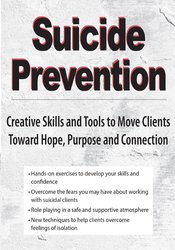

Meaningless and isolation – suicidal people don’t feel “a sense of belonging.” Yet common strategies tend to increase this sense of isolation by viewing suicidal individuals as people to be feared, mechanistically observed, and sometimes isolated for their own “safety.”
Watch this recording to overcome common fears about approaching the topic of suicidal ideation with clients, and learn creative and compassionate techniques to deeply, warmly, and safely guide your clients through the dark places and back into the light.
You’ll feel transformed in the way you think about suicidal clients, and the way you think about yourself as a helping professional and human being.
Discover how to decrease clients’ sense of isolation, and effectively utilize innovative techniques to restore hope. Role playing and hands-on exercises will give you the opportunity to practice new strategies in a safe, supportive environment.
Leave this recording with a new confidence and creative skills to help people move from the dark, lonely, meaningless place into a place of hope, purpose, and connection with fellow human beings!
| File type | File name | Number of pages | |
|---|---|---|---|
| Manual - Suicide Prevention (1.2 MB) | 43 Pages | Available after Purchase | |
| Manual - Suicide Prevention - French (1.2 MB) | 43 Pages | Available after Purchase | |
| Manual - Suicide Prevention - Italian (1.2 MB) | 43 Pages | Available after Purchase | |
| Manual - Suicide Prevention - German (1.2 MB) | 43 Pages | Available after Purchase | |
| Manual - Suicide Prevention - Spanish (1.2 MB) | 43 Pages | Available after Purchase |
Dr. Nancy K. Farber, is a licensed clinical psychologist, school counselor, and veteran professor of school, community, and clinical counseling. She is a humanistic psychologist who is known for her lively, musical, experiential teaching style.
She has served as an associate professor at Eastern Illinois University and a supervising psychologist at Torrance State Hospital where she worked intensively with suicidal clients both in groups and individually, and trained psychology doctoral interns. Dr. Farber specializes in group psychotherapy and has worked at university counseling centers across the country including Purdue University, Illinois State University, Bowling Green State University, and Ball State University. She works as a psychotherapist in private practice in Hershey and Palmyra, PA.
Dr. Farber is also a published researcher and author who has written articles for referred journals and presented both research and training workshops at the American Psychological Association, American School Counselor Association, Illinois Counseling Association, and Pennsylvania Psychological Association.
Dr. Farber holds a Ph.D. in counseling psychology from Ball State University, an MS.Ed. in psychological services from the University of Pennsylvania, and a B.S. in communication arts from Cornell University. She also holds a B.A. in music from Lebanon Valley College.
Speaker Disclosures:
Please wait ...